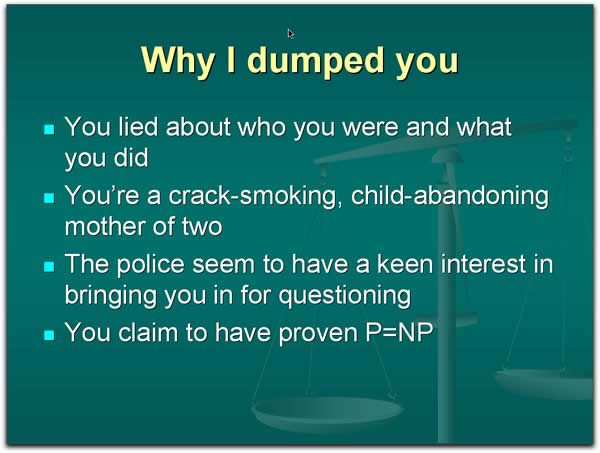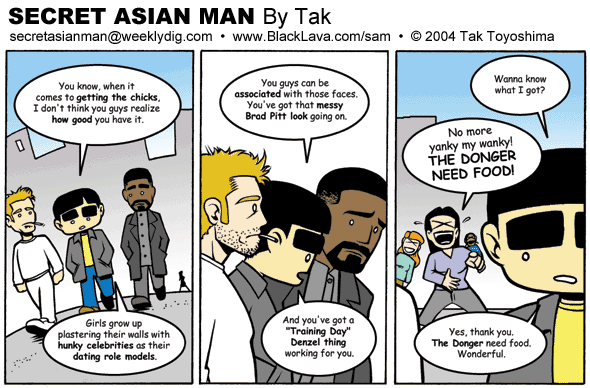The scene: The bar at the Bovine Sex Club, during Kickass Karaoke’s 5th Anniversary. I’m ordering a pint of Shanghai Stout from Deanna the bartender when a young woman approaches.
Her: Hey, Accordion Guy, got a minute?
Me: Sure. What’s up?
Her: You’re a computer guy, aren’t you?
Me: Yeah. Got a computer problem?
Her: Sort of. You see, I got dumped last week…
Me: Oh. Sorry to hear that.
Her: …by e-mail. What I wanted to ask was: Is that normal for computer guys?
Me: I don’t think so.
Her: And if that wasn’t enough, he fucking listed everything that was wrong with me. In fucking point form.
Me: That’s strange.
Her: Tell me about it!
Me: Wait. You know, maybe it’s not so unusual. I just remembered — you’re not the first to say this. You’re the third or fourth person this year to tell me that she got dumped by email and had reasons why listed in point form in the past year.
It’s true: since the beginning of the year, a handful of people have told me that they were dumped in this fashion. If you go farther back, you can add two more to that list.
The underlying idea of using email to deliver unpleasant news isn’t all that novel. You’ve probably had to phone someone to cancel plans and were relieved to get their voice mail or answering machine rather than the actual person, and you may have even heard of situations where people have broken up over the phone. Breaking up in writing was common enough for the term “Dear John Letter” to be coined. In these situations, the bearer of bad news is trying to weasel out of having to deal with the reaction.
Listing the reasons for a breakup, whether the breakup is taking place in person, by postal mail, over the phone or email, isn’t new, either. What is new is listing the reasons in point form.
I believe I know the cause of this phenomenon. Allow me to illustrate it:

1. We start dating. 2. ??????? 3. DUMPSVILLE!
PowerPoint.
Or more accurately, office culture, of which PowerPoint is a cornerstone.
(The slide above is part of a hypothetical PowerPoint presentation that I would’ve made for the New Girl from this story.)
I think that the “Dear Jane” emails that those people received were inspired by elements of office culture: PowerPoint, project post-mortems and annual performance reviews. Of the people who told me that they were dumped via email, all of their boyfriends worked white-collar jobs in which they either sat through or made PowerPoint presentations.
As Information Architecture guru Edward Tufte points out in his book, The Cognitive Style of PowerPoint, PowerPoint presentations sacrifice substance for style, are incredibly information-sparse, use abbreviations and syntactic shortcuts since you can’t fit that much on a slide and are really for the benefit of the speaker, not the audience. PowerPoint faciltitates getting through an unpleasant task as quickly as possible, which is a primary goal in both business presentations and breakups.
You might think I’m being facetious by blaming PowerPoint. However, history and everyday experience show us that our technology affects our culture, from things as simple as levers and the wheel to cell phones, computers and the internet.
Furthermore, the same technology can have a different “spin”, depdending on the manufacturer. Consider the general grittiness of PlayStation and XBox games (and note that both consoles are in imposing black cases) versus the relative kid-friendliness of Nintendo GameCube games (and the console’s cute white cube). Better yet, consider the “digital lifestyle” feel of the Mac and its applications versus Windows and its apps, which Danny O’Brien aptly summarizes with this sharp line in this blog entry:
Ultimately when you use MS software, you’re not the end user MS perceives at all: we’re just living off the scraps Microsoft leaves out after feeding its big customers.
As software evolves and we move on to the next big thing, I figure that social software will provide us with new paradigms for breakups. Perhaps Orkut will lead the way, and one day we’ll get messages like this:




